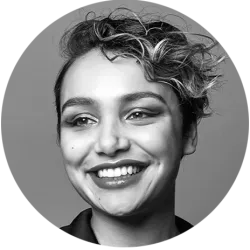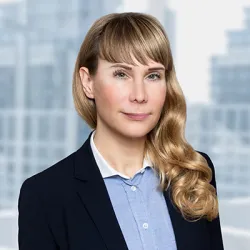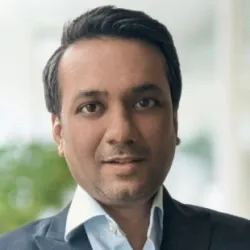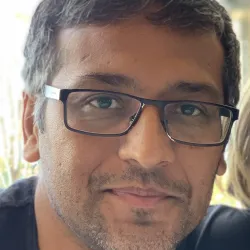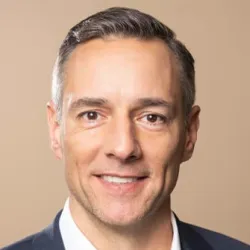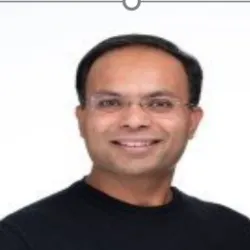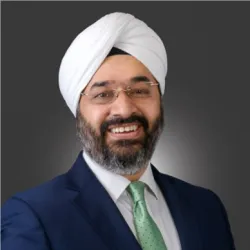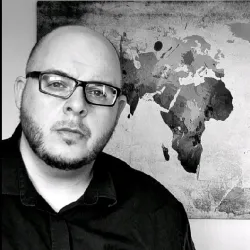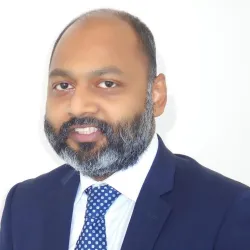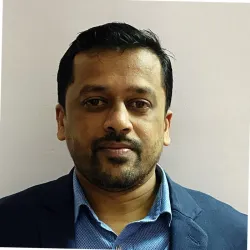Agenda
RiskTechAI50 Agenda
RiskTechAI50 Agenda
Tuesday, July 23, 2024 - 9am EDT / 2pm GMT
Day one offers a dynamic blend of panels and presentations centered on the AI technology stack and AI models in production. Expert speakers will demystify AI terminology and buzzwords, placing GenAI innovations within the context of mature AI applications across the financial landscape. Attendees will gain valuable insights into how AI can be effectively integrated into risk management frameworks, bridging the gap between theoretical advancements and real-world implementation.
09:00 – 09:01
Welcome Message
01:01 - 01:02
Mark has over 30 years’ experience in global capital markets, consulting and associated technologies, focusing on risk management, front- and middle-office platforms and data management. Before Chartis he held executive positions in large global financial institutions, consultancies and FinTechs, in various roles including platform and software development, solution architecture, large-scale program management, vendor selection and implementation, and strategy development and execution.
With a background covering the front, middle and back office, Mark brings to Chartis a holistic view of business, technology and regulatory issues across the enterprise, and how these issues can be addressed by leveraging appropriate technology solutions. His primary focus has been risk technology, and his work in this area includes: leading the global teams for risk technology at RBS Capital Markets and AIG; working with middle- and front-office technology teams at Barclays Capital; extensive consulting experience with major consulting organizations including EY and Deloitte; and extensive vendor experience, including time at Algorithmics and Misys (now Finastra). Mark has an MA from Oxford University and is a Fellow of the Institute of Chartered Accountants in England and Wales.
09:01 – 09:10
Presentation - Chartis Research insights: Enduring innovations in the AI hardware race
01:01 - 01:02
The hardware race is on, spurring geopolitical tensions, advancements in chip design and manufacturing, and significant investments by major companies. The escalating scale of AI workloads, particularly those related to Generative AI (GenAI), has propelled this race as companies strive to build cloud infrastructures capable of supporting intensive AI training and deployment.
Key developments include the emergence of new cloud computing platforms and specialized datacenters, such as GPU clouds – developed to handle the immense computational demands of AI applications. In risk management, AI is not only prompting novel hardware innovations but also focusing attention on cutting-edge computing architectures.
This dynamic environment underscores the critical intersection of AI and hardware advancements, highlighting how the race to develop AI infrastructure is shaping the future of technology and industry practices.
Sid is the Chief Researcher at Chartis Research with more than 20 years of experience in the financial, energy and commodities markets in various functions across the trade and software development lifecycles. He has held various roles in product development, trading, risk management, software development and consulting in banks, hedge funds, and risk advisory and software firms, including Standard Chartered Bank, TCG Group, HCL and Cognizant.
Sid’s specific areas of interest and research include risk data, model risk management, quantitative models in illiquid markets, high-performance analytics, energy and commodity trading risk, market structure design, new computational models, and the use of innovative mathematical methods in various emerging areas of risk management .He has a MBA from the Indian Institute of Management and is a qualified Chartered Alternative Investment Analyst CAIA, Financial Risk Manager (FRM) ,Energy Risk Professional (ERP), Member of GARP and CIPM from the CFA institute.
09:10 – 09:30
Fireside chat: Back to the future - the evolution of AI in the financial services and risk management
01:01 - 01:02
AI tools – specifically neural networks – have been used in financial services since the 1980s, and AI in this context has gone through its own waves of hype. In this panel discussion, we examine the maturity of AI across different areas in risk management and compliance. The panel will consider how dynamics like data availability, data format and regulatory oversight have informed the way AI has developed across risk segments and business lines.
Sid is the Chief Researcher at Chartis Research with more than 20 years of experience in the financial, energy and commodities markets in various functions across the trade and software development lifecycles. He has held various roles in product development, trading, risk management, software development and consulting in banks, hedge funds, and risk advisory and software firms, including Standard Chartered Bank, TCG Group, HCL and Cognizant.
Sid’s specific areas of interest and research include risk data, model risk management, quantitative models in illiquid markets, high-performance analytics, energy and commodity trading risk, market structure design, new computational models, and the use of innovative mathematical methods in various emerging areas of risk management .He has a MBA from the Indian Institute of Management and is a qualified Chartered Alternative Investment Analyst CAIA, Financial Risk Manager (FRM) ,Energy Risk Professional (ERP), Member of GARP and CIPM from the CFA institute.
Dr. Elliot Noma PhD
Lecturer in the Math Department • Financial Risk Management and AI in Finance
Rutgers University
Dr. Elliot Noma has worked on machine learning models for the past 10 years with a emphasis on natural language processing and generative AI at Dunn & Bradstreet, the Federal Reserve Bank of New York, the Royal Bank of Canada, and the Financial Industry Regulatory Authority.
Dr. Noma is also the founder of Garrett Asset Management, an investment firm that uses behavior models to trade in futures, ETFs, and currencies. Prior to founding Garrett Asset Management, Dr. Noma was a portfolio manager running a fund of hedge funds and was the Chief Risk Officer at Asset Alliance Corporation, a seeder of hedge funds.
Dr. Noma teaches risk management and machine learning in the Masters in Mathematical Finance program at Rutgers. He holds a Ph.D. in mathematical psychology for the University of Michigan and a B.A. in mathematics from Dartmouth College.
Dr. Noma's current research includes the application of generative AI to help agents answer questions about health, fitness and financial benefits available to employees of large corporations. He also applies statistical and natural language tools to better assess investor’s appetite for risk and willingness to invest in sustainable investments.
Marcelo Labre is CEO and co-founder of Viridios AI, a financial technology company applying AI and data analytics to climate markets. He has over 20 years AI, technology and financial markets experience across multiple markets and continents. As a pioneer in the carbon markets, he has worked on some of the most innovative solutions in this carbon market to date. Marcelo is also a subject matter expert and thought leader on applications of AI in finance. An engineer by training, he has a Masters in Finance from London Business School and PhD in Mathematical Finance from Imperial College London.
09:30 – 09:50
Presentation - Extracting value with vector databases
01:01 - 01:03
As a method of storing vector embeddings, vector databases have become a mainstay of the LLM ecosystem. The popularity of Retrieval Augmented Generation (RAG) is further fueling their growth as firms seek ways to manage LLM data recency issues and domain specific/internal data retrieval. This presentation explores how firms leverage vector databases and how are the interacting with other data formats for processes like hybrid search. Growing interest in scalability and database-driven structural bottlenecks is also catalyzing the development of more general-purpose vector and array databases alongside long-standing special-purpose arrays.
David Pacheco Aznar is the Chief of AI Research and Development at RavenRisk AI, where he is leading the development of a custom pipeline for the application of Large Language Models in corporate credit risk in the US market. He is also a faculty member at the AI in Finance Institute, where he has given multiple conferences on Generative Models and Reinforcement Learning, in addition to having published two papers with AIFI on those topics. He also developed a custom deep reinforcement learning architecture for equities portfolio management which he presented at QuantMinds International and other conferences.
Finally, in the academic realm, he was a teaching fellow at Columbia University on Big Data and Recommender Systems. He is co-author of two upcoming books: "AI in Finance" for Risk Editoriala and "Large Language Models" for Springer Nature, and he studied Computational Mathematics and Data Science at the A
09:50 – 10:00
Presentation - Chartis Research insights: Rethinking the hype cycle: Unravelling the complex trajectories of technology
01:01 - 01:12
Hype is a fundamental aspect of technological innovation, and it can help to drive investment. But it can also obscure a pragmatic view of a particular technology’s evolving use cases. This presentation discusses, however, how commentary that runs counter to the hype often doesn’t capture the complex trajectories of technology.
Maryam is a Senior Research Specialist at Chartis, focusing on quantitative methods in financial risk management – including Artificial Intelligence/Machine Learning. Maryam has been the lead analyst and author of a variety of industry and thought leadership reports, including insurance risk systems, asset and liability management and credit risk analytics. She also works on risk-aware accounting and governance risk and compliance (GRC) – focusing on model risk management (MRM). Maryam has been involved with a variety of Business - Technology strategy projects and other types of consulting work. Maryam has experience using statistical software, machine learning libraries, Python and MATLAB. She also specializes in graphics production and visualizations. Maryam holds a first-class BA Honours from the London School of Economics and an MSc in computation and cognition with distinction from Birkbeck, University of London. Maryam also has a certificate in Risk in Financial Services from the Chartered Institute for Securities & Investment.
Other areas of interest include computer vision research, rule-based symbol systems, neural computation and cognitive modeling.
10:00 – 10:25
Panel discussion - RAG, fine tuning and the future of domain-specific models in finance
01:01 - 01:21
LLMs are often promoted as versatile tools capable of addressing a wide array of problems. However, their effectiveness is significantly influenced by the data on which they are trained and their integration into existing systems. RAG has become a popular method for enabling LLMs to access and reference internal business data. This panel will delve into the promises and challenges of RAG, along with the ongoing evolution of fine-tuning techniques for LLMs. Key methods such as Retrieval Augmented Fine Tuning (RAFT) and reranking, which affect performance and accuracy, will be discussed. Additionally, the panel will cover methods like:
• Direct Policy Optimization (DPO)
• Reinforcement Learning from Human Feedback (RLHF)
• Online Robust Policy Optimization (ORPO)
• Knowledge Transfer Optimization (KTO)
• Iterative Policy Optimization (IPO).
Maryam focuses on risk-aware accounting and advanced analytics in financial risk management and has been a lead analyst and author on a variety of industry and thought-leadership reports covering areas including insurance risk systems, asset and liability management, and credit risk analytics. She also works on Chartis’ governance, risk management, and compliance (GRC) research, focusing on model risk management, and runs Chartis’ production, specializing in visualizations. Maryam holds a first-class BA Honours from the London School of Economics and is currently completing a master's degree in computation and cognition; she also has a certificate in Risk in Financial Services from the Chartered Institute for Securities & Investment.
Nicole is a Data Scientist & Quantitative Researcher currently working as Chief AI Officer & Head of Quantitative Research at quantmate. Alongside her roles in this organization, she also serves as an AI consultant, leading workshops and guiding companies from AI concept to deployment. As a guest lecturer, Nicole shares her expertise in Python, machine learning, and deep learning at various universities. She is a frequent speaker at AI and Quantitative Finance conferences and events. She is the author of Mathematics for Machine Learning with NLP and Python and Transformers in Action with Manning Publications, and the author of the (forthcoming) book Transformers: The Definitive Guide by O’Reilly Media.
Miquel is a co-founder at Artificial Intelligence Finance Institute. He is a financial markets practitioner with more than 20 years of experience in asset management. Additionally to his role at AIFI, he is currently Head of Development at Global AI (Big Data Artificial Intelligence in Finance company) and Head on Innovation and Technology at IEF.
He worked for UBS AG (Switzerland) as Executive Director for the last 10 years and previously worked as a Chief Investment Officer and CIO for Andbank from 2000 to 2006.
He is a professor of Big Data in Finance at ESADE and Adjunct Professor at Columbia University teaching Asset Allocation, Big Data in Finance and Fintech. He received an MBA and a Degree in business administration and economics in ESADE (1993).
In 2010 he earned a PhD in quantitative finance with a Summa Cum Laude distinction (UNED – Madrid Spain).
10:25 – 10:50
Presentation - Evaluating LLMs
01:01 - 01:02
Evaluating LLMs is an evolving field, advancing alongside the rapid release of new models and their widely publicized features. The challenge in measuring and comparing LLMs stems from the variability in their output and the diverse criteria for assessment. Any evaluation should utilize distinct datasets, ensuring that models have not been previously exposed to the data. Industry frameworks typically assess aspects such as accuracy, robustness, toxicity, and efficiency. However, these evaluations can spark vigorous debate and disagreement. This presentation delves into the potential for standardizing industry benchmarks and envisions the future of comprehensive LLM evaluation.
With 17+ years of experience, I am currently working as Senior Vice President, Data Engineering at JPMorgan Chase. In my current role, I am responsible for defining, leading and evangelizing analytics solutions leveraging Data Science and ML offerings. I am directing end-to-end model development and deployment life cycle. My key expertise are NLP and am too passionate for Generative AI. I am also actively involved in career mentoring, up-skilling and coaching students from reputed universities and working professionals. I am Google Women Tech Ambassador and part of IEEE ICWITE Organizing Committee
10:50 – 11:15
Panel discussion: machine learning models and LLMs in production
01:01 - 01:02
Deploying machine learning models, particularly LLMs, presents a unique set of challenges. This panel will delve into the requirements for deploying classical machine learning models and examine the new AI infrastructure needed to support LLM applications. We will explore various options for deploying LLMs, including commercial APIs, cloud model aggregators, self-hosting, and open-source libraries. Key considerations such as security, rate limits, inference costs, model storage, and model dependencies will be discussed to understand how these factors influence firms' decisions in their LLM deployment strategies.
Maryam focuses on risk-aware accounting and advanced analytics in financial risk management and has been a lead analyst and author on a variety of industry and thought-leadership reports covering areas including insurance risk systems, asset and liability management, and credit risk analytics. She also works on Chartis’ governance, risk management, and compliance (GRC) research, focusing on model risk management, and runs Chartis’ production, specializing in visualizations. Maryam holds a first-class BA Honours from the London School of Economics and is currently completing a master's degree in computation and cognition; she also has a certificate in Risk in Financial Services from the Chartered Institute for Securities & Investment.
Nirav Shah
Senior executive director, head of AM ESG & quant technology
J.P. Morgan Asset Management
Nirav Shah is a distinguished technology executive with extensive experience in leading engineering teams and driving innovation in the financial services industry. He currently serves as the Senior Executive Director of Quant & ESG Engineering at J.P. Morgan Asset Management in London, a role he has held since November 2022. In this position, Nirav leads a global team of engineers to advance J.P. Morgan Asset Management’s Quant and Sustainable Investing objectives, leveraging data, analytics, and cloud-native technologies, particularly AWS.
Before joining J.P. Morgan, Nirav was the Head of ESG Analytics at M&G plc, where he was instrumental in creating the company's strategic ESG Analytics & Data infrastructure. From November 2020 to January 2023, he focused on integrating ESG, Climate, and Impact Analytics across M&G’s asset management and asset owner businesses. His work helped transition £300 billion of assets under management to sustainable investments using cutting-edge data and machine learning techniques.
Nirav’s career also includes a significant tenure at Commerzbank AG, where he served as the Engineering Lead for the Murex FICC & Equity Platforms from January 2017 to October 2020. He led the development and delivery of major initiatives across the bank’s trading business lines and spearheaded digital and operational transformations using agile, DevOps, and automation principles.
Earlier in his career, Nirav held the role of Team Lead for the Client Money Platform at Goldman Sachs, from September 2013 to December 2016. He managed technology projects related to regulatory compliance for listed derivatives and OTC derivatives, and led global teams in implementing key regulatory changes.
Nirav began his professional journey as a Software Engineer at Wall Street Systems, followed by a Software Developer role at NetDev Ltd, and started as a Programmer Analyst at Infosys Technologies Limited. His technical expertise spans Java, Kubernetes, Python, and AWS, among other technologies, and he has a proven track record in solution architecture, climate risk, and team leadership.
Brennan is an experienced Machine Learning professional with a background in Information Technology solutions, Business Analytics, big data and AI.
Currently, he serves as Senior Machine Learning Engineer at Iguazio (acquired by McKinsey & Company), bringing his expertise to help Data Scientists, Data Engineers, and ML Engineers work together to deploy AI/ML applications faster, more efficiently and in a reproducible way. Before that he spent 8 years at SAS in various technology roles.
Brennan holds a BS in Computer Science from UNC Wilmington and previously served in the Marine Corps.
He lives in North Carolina with his family, and when he’s not tangling with big data for customers, he enjoys tangling with big fish!
11:15 – 11:35
Panel discussion - State-of-the-art in LLMs
01:01 - 01:21
This panel explores the state-of-the-art in LLMs. Highlighting the pace of LLM releases, new training techniques, scaling laws and new frontiers like agentic LLMs. Agentic LLMs may support better integrated LLM workflows in the future, addressing issues such as memory and query context, processing time, multi-step actions and data access. Topics also include the future of domain-specific models in finance, including the role of open-source models.
Maryam focuses on risk-aware accounting and advanced analytics in financial risk management and has been a lead analyst and author on a variety of industry and thought-leadership reports covering areas including insurance risk systems, asset and liability management, and credit risk analytics. She also works on Chartis’ governance, risk management, and compliance (GRC) research, focusing on model risk management, and runs Chartis’ production, specializing in visualizations. Maryam holds a first-class BA Honours from the London School of Economics and is currently completing a master's degree in computation and cognition; she also has a certificate in Risk in Financial Services from the Chartered Institute for Securities & Investment.
11:35 – 11:45
Fireside Chat: AI at work: shifting mindsets, closing gender gaps, and embracing change
01:01 - 01:02
As AI continues to revolutionize various aspects of the workplace, this discussion will explore its impact on workplace relationships, task engagement, and strategies to ensure inclusive adoption across genders. Our panelists will address the transformative potential of AI, focusing on practical advice for individuals and organizations to navigate this change effectively.
Maryam focuses on risk-aware accounting and advanced analytics in financial risk management and has been a lead analyst and author on a variety of industry and thought-leadership reports covering areas including insurance risk systems, asset and liability management, and credit risk analytics. She also works on Chartis’ governance, risk management, and compliance (GRC) research, focusing on model risk management, and runs Chartis’ production, specializing in visualizations. Maryam holds a first-class BA Honours from the London School of Economics and is currently completing a master's degree in computation and cognition; she also has a certificate in Risk in Financial Services from the Chartered Institute for Securities & Investment.
Yota is a software engineer-turned-coach, and the founder of Together in tech, a tech community with over 6000 members. She has worked in tech for over 15 years, leading teams at Amazon and Yahoo before getting her MSc in Applied Positive Psychology & Coaching, and becoming an ICF accredited coach. As a UN Women UK Delegate to the United Nations Commission on the Status of Women, Yota is a powerful advocate for gender diversity and inclusion in the tech industry.
Her mission to help people in tech unlock their inner confidence and become inspiring leaders has brought her to work with some of Europe's biggest tech companies, including Sky, Booking.com, Delivery Hero, Amazon, and Google. She is also a guest lecturer at UCL, and speaks widely about leadership, confidence, imposter syndrome, and women in tech. In 2022 she was awarded with the Leading with Purpose Award from the Reframe Women in Tech Awards.
11:45 – 11:46
RiskTechAI 50 winners’ announcements 26-50
01:01 - 01:02
11:46 – 11:47
Closing remarks and end of day 1
01:01 - 01:02
Mark has over 30 years’ experience in global capital markets, consulting and associated technologies, focusing on risk management, front- and middle-office platforms and data management. Before Chartis he held executive positions in large global financial institutions, consultancies and FinTechs, in various roles including platform and software development, solution architecture, large-scale program management, vendor selection and implementation, and strategy development and execution.
With a background covering the front, middle and back office, Mark brings to Chartis a holistic view of business, technology and regulatory issues across the enterprise, and how these issues can be addressed by leveraging appropriate technology solutions. His primary focus has been risk technology, and his work in this area includes: leading the global teams for risk technology at RBS Capital Markets and AIG; working with middle- and front-office technology teams at Barclays Capital; extensive consulting experience with major consulting organizations including EY and Deloitte; and extensive vendor experience, including time at Algorithmics and Misys (now Finastra). Mark has an MA from Oxford University and is a Fellow of the Institute of Chartered Accountants in England and Wales.
Wednesday, July 24, 2024 - 9am EDT / 2pm GMT
Day two of the event focuses on the practical applications of AI in risk management and other sectors. We'll examine the evolution of various use cases and how AI techniques support complex modeling requirements. In addition to discussing the diverse data needs essential for machine learning algorithms, the day will explore the integration of AI models into solutions and platforms. Key topics include document management, credit risk scoring, fraud and identity analytics, generative approaches to code, and more. Participants will gain insights into the tangible ROI of AI methods, along with the productivity and efficiency improvements they offer. Join us to explore the current industry landscape and the future of AI in risk management.
09:00 – 09:01
Welcome Message
01:01 - 01:02
Mark has over 30 years’ experience in global capital markets, consulting and associated technologies, focusing on risk management, front- and middle-office platforms and data management. Before Chartis he held executive positions in large global financial institutions, consultancies and FinTechs, in various roles including platform and software development, solution architecture, large-scale program management, vendor selection and implementation, and strategy development and execution.
With a background covering the front, middle and back office, Mark brings to Chartis a holistic view of business, technology and regulatory issues across the enterprise, and how these issues can be addressed by leveraging appropriate technology solutions. His primary focus has been risk technology, and his work in this area includes: leading the global teams for risk technology at RBS Capital Markets and AIG; working with middle- and front-office technology teams at Barclays Capital; extensive consulting experience with major consulting organizations including EY and Deloitte; and extensive vendor experience, including time at Algorithmics and Misys (now Finastra). Mark has an MA from Oxford University and is a Fellow of the Institute of Chartered Accountants in England and Wales.
09:01 – 09:11
Chartis Research insights - Governance and policy in the age of GenAI
01:01 - 01:02
The development of LLMs relies on vast amounts of unlabeled internet data, raising concerns about documentation and governance practices. Despite filters to remove toxic and discriminatory language, LLMs often encode bias and stereotypes, reflecting the lack of diversity in training datasets. This issue is exacerbated by the dominance of Western language models and insufficient representation of other languages in LLM research. Additionally, supply chain issues in outsourcing data labeling for tasks and copyrighted data inputs complicate governance. While existential threats make headlines, a core challenge in AI risk management lies in data governance and documentation. This presentation explores emerging AI governance issues within the framework of current and developing regulations, including financial regulations, the EU AI and the Digital Services Act.
Maryam is a Senior Research Specialist at Chartis, focusing on quantitative methods in financial risk management – including Artificial Intelligence/Machine Learning. Maryam has been the lead analyst and author of a variety of industry and thought leadership reports, including insurance risk systems, asset and liability management and credit risk analytics. She also works on risk-aware accounting and governance risk and compliance (GRC) – focusing on model risk management (MRM). Maryam has been involved with a variety of Business - Technology strategy projects and other types of consulting work. Maryam has experience using statistical software, machine learning libraries, Python and MATLAB. She also specializes in graphics production and visualizations. Maryam holds a first-class BA Honours from the London School of Economics and an MSc in computation and cognition with distinction from Birkbeck, University of London. Maryam also has a certificate in Risk in Financial Services from the Chartered Institute for Securities & Investment.
Other areas of interest include computer vision research, rule-based symbol systems, neural computation and cognitive modeling.
09:11 – 09:35
Panel - Enhancing document management and transparency with AI (ML, NLP and LLMs)
01:01 - 01:02
Effective document management and transparency are fundamental components of risk management. The complexity of lengthy and detailed loan contracts, with their extensive terms and conditions, poses significant challenges for automated analysis. This panel will explore the various AI methodologies applied to improve applications such as internal document search and investment research.
Our expert panelists will discuss practical AI solutions currently being implemented, such as NLP for document classification and extraction, machine learning algorithms for predictive analysis, and advanced search capabilities for more efficient information retrieval.
Maryam focuses on risk-aware accounting and advanced analytics in financial risk management and has been a lead analyst and author on a variety of industry and thought-leadership reports covering areas including insurance risk systems, asset and liability management, and credit risk analytics. She also works on Chartis’ governance, risk management, and compliance (GRC) research, focusing on model risk management, and runs Chartis’ production, specializing in visualizations. Maryam holds a first-class BA Honours from the London School of Economics and is currently completing a master's degree in computation and cognition; she also has a certificate in Risk in Financial Services from the Chartered Institute for Securities & Investment.
Darren leads the S&P Global Market Intelligence Networks businesses, which includes our Capital Markets, Brokerage Research, Sales & Trading, Counterparty Manager, Loan Platforms, KYC & Managed Services offerings.
In his role, Darren is responsible for designing and innovating our networks strategy that customers rely on for the proper functioning of their businesses and as a critical partner for the future. During his tenure at S&P Global, Darren has launched several new products and innovations over the past few years, including CLM Pro for Client Onboarding and Regulatory compliance, Outreach360 for client and regulatory outreach, Tax form validation utility, KYC services, Onboarding Accelerator for custody and markets onboarding, and legal document digitization and automation. He has over 20 years of experience in driving technology change and helping firms efficiently adapt to global regulations.
Prior to joining the company, Darren worked at both Barclays and UBS where he ran technology and operations across OTC, Futures, FX and regulatory change programs. He began his career as a management consultant at PwC focusing on Manufacturing & Pharmaceuticals. He has been active in industry organizations and previously co-headed the ISDA Credit Derivatives Implementation Working Group during the global financial crisis.
Darren holds a bachelor's degree in Mechanical and Aeronautical Engineering from Cornell University and received his MBA from the University of Georgia, both United States.
Kieran is responsible for the technology roadmap and functional direction of the EDM platform in the public and private asset management verticals. He oversees a global team of subject matter experts and business analysts who develop new vertical solutions for the data aggregation, quality management and information distribution functions. Prior to assuming the product management role for EDM, Kieran ran the solution engineering teams at CoreOne Technologies and DST Global Solutions.
He holds a Bachelor of Arts in Political Science from the University of Connecticut, US.
Biljana Vujović is cheif risk officer for Addiko Bank, supervising the bank's management team, ensuring effective decision making and adherence to ethical standards. Her role includes continuously evaluating the bank's risk appetite and ensuring that risk management strategies are implemented effectively, ensuring that bank consistently meets regulatory standards, monitoring for potential violations, and overseeing the establishment and effectiveness of internal controls, as well as supervising the internal and external audit to ensure they are robust and independent.
Vujović also chars the risk committee of the supervisory board
09:35 – 09:44
Presentation - New credit perspectives: the evolution of credit scoring
01:01 - 01:02
Credit scoring is one of the earlier applications of machine learning in the financial industry. With the expansion of diverse data sources, including alternative data, sophisticated models are being developed to enhance loan decisions and improve credit scoring accuracy. This session will explore how modern machine learning techniques are transforming credit scoring by leveraging vast amounts of data to create more nuanced assessments of creditworthiness.
However, implementing these advanced models comes with challenges. Regulatory frameworks, such as the EU AI Act and the Fair Lending Compliance, impose stringent requirements to ensure robustness, accuracy, and transparency in AI systems. The session will address practical concerns related to data privacy, model validation, and compliance with evolving regulations.
Sid has more than 20 years of experience in the financial, energy and commodities markets in various functions across the trade and software development lifecycles. He has held various roles in product development, trading, risk management, software development and consulting in banks, hedge funds, and risk advisory and software firms, including Standard Chartered Bank, TCG Group, HCL and Cognizant.
Sid’s specific areas of interest and research include risk data, model risk management, quantitative models in illiquid markets, high-performance analytics, energy and commodity trading risk, market structure design, new computational models, and the use of innovative mathematical methods in various emerging areas of risk management.
09:44 – 09:55
Presentation - Optimizing code with ML and Generative AI models
01:01 - 01:02
This presentation explores the cutting-edge advancements in code generation and optimization using machine learning and generative AI models. The presentation will explore the current state-of-the-art technologies, their evolution, and how developers are integrating these innovations into their workflows. Topics will include automated code completion, bug detection and code optimization, highlighting their impact on the software development landscape. The presentation will also address the challenges and considerations in adopting these technologies, such as the amplification of bugs and security issues.
Sergio Pereira has been building technology for the past 15 years and has served as a Startup CTO since 2014. He is passionate about startups and enjoys collaborating with founders to transform their promising business ideas into products that fulfill market opportunities. Sergio helps these startups grow from nimble operations into fully-fledged companies poised for scale. Over his 8-year tenure as a Startup CTO, he has twice been a co-founder and has worked with more than 10 startups as a Fractional CTO.
In recent years, Sergio has focused on Fintech, launching Income Share Agreements for the first time in Europe and deploying a successful solution to alleviate the student debt burden in the US. As a Fractional CTO, he has worked with companies in payments, lending APIs, KYC/AML funnels, NFTs, and other Fintech use cases. Additionally, he has experience with startups in eCommerce, HR, legal, and other fields, despite his primary focus on Fintech.
Sergio is "stack agnostic" when it comes to technology, having worked with various stacks (Javascript, Java, Python, Ruby, PHP, Solidity), cloud providers (AWS, Azure, GCP, Heroku), and tools. He evaluates constraints and trade-offs to determine the best stack for each specific company context and situation.
A strong advocate for remote work, Sergio has worked remotely since 2017 and has been building remote teams since then. Hiring and managing engineers is one of his specialties, and finding the best talent worldwide has become a passion. Embracing a global talent pool has been a key competitive advantage for him as a Startup CTO, and he has developed asynchronous processes to make his teams more performant and inclusive.
09:55 – 10:07
Presentation - Regulatory intelligence: opportunities and challenges using AI
01:01 - 01:02
Navigating the vast, complex, and ever-evolving regulatory landscape is a significant challenge for financial institutions. Machine learning algorithms offer powerful tools to manage extensive regulatory information, but ensuring accuracy and robustness is crucial. This presentation will explore cutting-edge tools and techniques used to extract key attributes from unstructured data, perform data mapping for standards and policies, and generate compliance alerts. Attendees will gain insights into how AI can streamline regulatory processes, enhance compliance efforts, and address the dynamic nature of financial regulations
Seasoned Executive with experience crafting product vision, creating product strategy, and delivering product experiences used by customers across global markets. Passionate about solving customer needs and driving rapid business growth. Creative problem solver with expertise in delivering great customer experiences across multiple customer touchpoints and growing teams.
Successful track record of delivering results, thinking big, innovating, and steering consensus across multiple technologies, business, and customer experience teams. Change agent known to challenge the status quo and traditional approach. Balanced judgment with technology and business perspective, strong problem-solving and analytical skills, global experience, and a customer-obsessed, entrepreneurial approach.
10:07 – 10:27
Panel discussion - Enriching identity and entity verification with AI
01:01 - 01:02
This panel explores the use of AI in enhancing identity analytics and entity verification. Experts will discuss how AI technologies can harness alternative data and improve the accuracy and efficiency of verifying individuals and entities, strengthening compliance and reducing fraud.
David is dedicated to refining interactions between humans and machines to produce high-quality analysis. To this end, David leads various product development and data analysis initiatives at Kharon. David previously worked at Innovations for Scaling Impact, where he analyzed efforts by multilateral institutions to address international security, global supply chains, and the environment. David holds an M.A. from Johns Hopkins University School of Advanced International Studies and a B.A. from Occidental College.
Joe is responsible for the vision, strategy and delivery of solutions across Ripjar’s technology stack. He has been an integral part of the Ripjar team since the company’s inception, scaling our technology and engineering team to counter evolving threats. Prior to Ripjar, Joe worked in a number of technology, research and analytical roles in national security. He specialises in developing scalable AI systems to derive insights from structured and unstructured data.
Phil is the Research Principal for Chartis’ Financial Crime Risk Management pillar, focusing on anti-money laundering, anti-fraud, Know Your Customer, trade-based money laundering, trade surveillance and related areas. He is also one of the primary analysts on Chartis’ RiskTech100, has managed vendor-selection projects in international financial institutions, and has produced market analysis and return on investment projects, as well as leading Chartis’ Risk IT Expenditure report.
10:27 – 10:38
Presentation - Enhancing the supervisory function with support data sets and automatic workflow
01:01 - 01:02
This presentation will explore how banks are structuring the investigation and analysis of financial crime prevention processes. Topics include support data sets, automatic workflows and clustering and categorization algorithms.
10:38 – 10:58
Panel - Revolutionizing fraud detection: harnessing the power of machine learning
01:01 - 01:02
Fraud poses a substantial financial challenge for insurance companies, driving significant investment into detection and prevention models. This panel will explore the transformative impact of machine learning algorithms on fraud detection, including supervised and unsupervised machine learning approaches. Panelists will discuss how these advanced algorithms enhance the accuracy and efficiency of fraud detection systems, the latest developments in machine learning for fraud prevention, and real-world applications and successes. Topics will also include the data management demands associated with these systems.
Phil is the Research Principal for Chartis’ Financial Crime Risk Management pillar, focusing on anti-money laundering, anti-fraud, Know Your Customer, trade-based money laundering, trade surveillance and related areas. He is also one of the primary analysts on Chartis’ RiskTech100, has managed vendor-selection projects in international financial institutions, and has produced market analysis and return on investment projects, as well as leading Chartis’ Risk IT Expenditure report.
Matt Wilkins is Product Manager in the SymphonyAI Financial Services team with responsibility for Fraud products. He has more than 30 years of experience working in the financial technology sector: most of this time has been dedicated to creating anti-Fincrime systems and delivering them to customers.
Gareth Davies has worked within the Allianz Group since 2012 during which time he has established several high performing anti-fraud units and acted as the technical lead on a number of high profile cross industry counter-fraud investigations. Gareth has developed a reputation within the industry as an expert on insurance fraud – winning the inaugural Allianz Claims High Flyer Award in 2015 and having been shortlisted for Young Fraud Investigator of the Year at The Insurance Fraud Awards in 2016. Since 2019, Gareth has worked as the Head of Fraud at Allianz Global, Corporate and Specialty where the work that he and his team have done in detecting and preventing international insurance fraud in the complex specialty marketplace was recognised with the team being awarded Counter-Fraud Team of the Year 2021 at last year’s Insurance Claims and Fraud Awards
10:58 – 11:18
Presentation: Explainability is all you need
01:01 - 01:02
The presentation is themed on explainability of AIML especially as a risk management approach in the context of applications of AIML in financial services. It expands on the what, why and how of explainability, emphasising the role of explainability in building trust towards AIML applications. The presentation gives a bird’s eye view on current tools and techniques including framework and metrics and concludes with most recent advances and future trends.
11:18 – 11:34
Panel - Operational risk analytics
01:01 - 01:02
This panel will cover the contribution AI has made to the analysis of operational risks, including cyber risk, supply chain risk and IT risk. Operational risks have been an area of relative maturity as AI projects have enabled firms to handle unstructured non-linear data. Standard statistical tools have historically been ineffective due to the lack of suitable operational data.
Sid has more than 20 years of experience in the financial, energy and commodities markets in various functions across the trade and software development lifecycles. He has held various roles in product development, trading, risk management, software development and consulting in banks, hedge funds, and risk advisory and software firms, including Standard Chartered Bank, TCG Group, HCL and Cognizant.
Sid’s specific areas of interest and research include risk data, model risk management, quantitative models in illiquid markets, high-performance analytics, energy and commodity trading risk, market structure design, new computational models, and the use of innovative mathematical methods in various emerging areas of risk management.
Massimo is a professional with a two-decade experience in Financial Services and Technology, an academic who authored several books and papers on maths and tech for markets, and a passionate innovator on the cutting edge of transformation in markets and financial technology.
He has beeen the Chief Economist of the Algorand foundation for more than 3 years. Algorand is an open blockhain platform focused on decentralization and security through cryptography and economic automation. Previously, he headed the fixed income (interest rates, credit, cross-currency and inflation) Quants in the Financial Engeneering at ISP, a top ten European bank, for more than a decade. In this role he led the design and implementation of mathematical and technological solutions for structuring, trading and risk management of financial products. He became a regular keynote speaker in the largest quant finance and risk management conferences. In the same years he advised several global financial insitutions, from the World Bank (2012-2020) to the Monetary Authority of Singapore (2017-2019).
Through scientific papers and books, his research has given core contributions to the solution of several financial problems, such as the management of Credit, Funding and Capital pricing adjustments, the modelling of the Interest Rate multi term structure and basis emerged with the financial crisis, and the management of Model Risk.
Since 2015, Massimo has pioneered the digitization and decentralizatio of Finance through blockchain technology. He was a Board Member of R3, the international consortium of largest banks for blockchain application, and one of the first contributors to the CORDA platform. He authored the first articles that described decentralized financial products and derivatives with smart contracts managing collateral and risk management (as happening in current DeFi), designing then a test implementation on Ethereum. His work on blockchain has been featured on CoinDesk, Risk Magazine, Bitcoin Magazine, Harvard Business Review and has been quoted by CFTC and US Senate.
In 2019, realizing that innovation was proceeding very slowly in traditional finance, he joined Algorand blockchain founded by Turing Prize and MIT Professor Silvio Micali, helping as Chief Economist the growth of the decentralized market, the decentralization of governance, and the growth of the DeFi sector. He believes that the jouney continues, since the open and tumultuous growth of the cryptocurrencies sector needs now to trigger innovation in regulated financial institutions.
Raghu Mahadev
Consulting partner - strategy & solutions BFSI risk and compliance initiative
Tata Consultancy Services Ltd (TCS)
Raghu Mahadev is a Consulting partner with the risk and compliance practice - BFSI focusing on partnerships across risk management capabilities, transformation solutions, risktech and regtech programs.
11:34 – 11:36
RiskTechAI 50 winners’ announcements 1-25
01:01 - 01:02
11:36 – 11:37
Closing remarks and end of day 2
01:01 - 01:02
Mark has over 30 years’ experience in global capital markets, consulting and associated technologies, focusing on risk management, front- and middle-office platforms and data management. Before Chartis he held executive positions in large global financial institutions, consultancies and FinTechs, in various roles including platform and software development, solution architecture, large-scale program management, vendor selection and implementation, and strategy development and execution.
With a background covering the front, middle and back office, Mark brings to Chartis a holistic view of business, technology and regulatory issues across the enterprise, and how these issues can be addressed by leveraging appropriate technology solutions. His primary focus has been risk technology, and his work in this area includes: leading the global teams for risk technology at RBS Capital Markets and AIG; working with middle- and front-office technology teams at Barclays Capital; extensive consulting experience with major consulting organizations including EY and Deloitte; and extensive vendor experience, including time at Algorithmics and Misys (now Finastra). Mark has an MA from Oxford University and is a Fellow of the Institute of Chartered Accountants in England and Wales.





